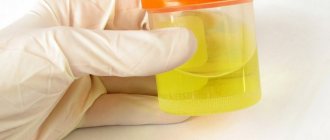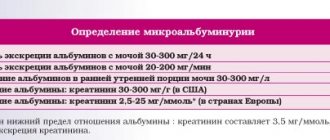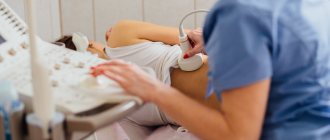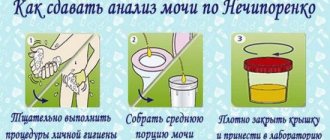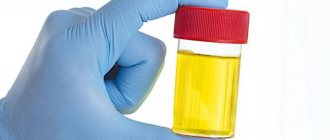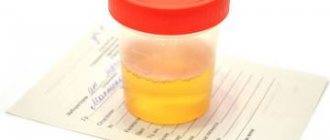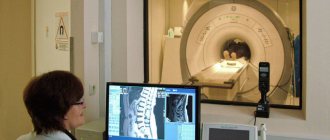When is a urine test needed?
Every person has encountered a general urine test. It is taken during an annual preventive examination and for diagnosing diseases of the genitourinary system:
- Cystitis (inflammation of the bladder).
- Pyelonephritis and nephritis (kidney inflammation). Pathologies of the genitourinary organs.
- Endocrine disorders (diabetes mellitus).
It is also important to get tested after suffering a streptococcal infection (sore throat, scarlet fever), influenza, pneumonia.
There are also specific tests - daily monitoring, urine for protein and sugar, urine sterility.
Rules for preparing for testing for catecholamine metabolites in urine
A few days before the test, it is necessary to strictly limit the consumption of foods: cheeses, fruits (avocados, bananas), walnuts, beans, alcohol, and limit the intake of medications.
It is necessary to avoid any situations that can cause an increase in catecholamines: be warm, do not overheat, drink enough water, do not worry, or undergo strong physical exertion.
Collecting urine for research:
For this study, 24-hour urine is collected with the addition of a preservative (a sample of citric acid).
1) During morning urination, completely empty the bladder and pour out this portion. Note the exact time when urine collection begins. Collect subsequent urine in a container (at least three liters), which should be stored in a cool place.
2) Add a portion of citric acid to the first portion of urine.
3) After collection is complete, measure the volume of urine collected. Daily volume data must be provided to the laboratory, about
4) Mix all collected urine thoroughly. About 50 ml of daily urine is collected in a sterile container and delivered to the laboratory.
The day before the culture test, it is advisable to exclude over-salted, smoked, fatty foods, alcohol and medications from the diet. It is also not recommended to consume large amounts of sweet and sour foods, and avoid taking antibacterial drugs. After taking antibacterial drugs, it is recommended to get tested no earlier than 7-10 days later.
Take the test in the morning, after a night's sleep.
Before collecting urine, it is necessary to clean the area of the genitourinary system from biological secretions, that is, wash yourself, but do not use antibacterial products for intimate hygiene.
For bacterial culture, you need to submit an average portion of urine, up to fifty milliliters. That is, flush the first part down the toilet, collect the middle portion in a strictly sterile container, and put the rest back into the toilet.
It is advisable to immediately hand over the filled container to the laboratory, but do not shake it too much and avoid temperature changes. If a urine test cannot be immediately sent for research, then you can place the container with urine in a cool and dark place, but for no more than two hours.
1. One day before donating urine, you need to adjust your diet: stop eating meat, brightly colored liquids (carrot, beet juice), alcohol (including beer), carbonated drinks, sweets, honey and confectionery.
- Avoid the use of diuretics and antibacterial drugs, as well as intense physical activity, as they can distort the test results.
- Before collecting urine, it is necessary to perform a hygienic toilet of the genital organs.
4.Women are not recommended to take a urine test during menstruation.
- The urine container collects approximately 50 ml of morning urine.
6. To conduct the study correctly, during the first morning urination, release a small amount of urine (the first 1-2 seconds) into the toilet, and then, without interrupting urination, collect approximately 50 ml of urine.
7.Immediately after collecting urine, close the container tightly and deliver it to the clinic as soon as possible.
Analysis reception hours at Socialist 208: Mon - Fri: 07:00 - 17:00. Sat: 07:00 – 12:00
Recommendations for collecting urine are the same as for a general urine test, but a strictly average portion of urine is collected in the container.
Analysis reception hours at Socialist 208: Mon - Fri: 07:00 - 17:00. Sat: 07:00 – 12:00
Preparing for the study
In order to obtain good biomaterial for analysis and to accurately determine all its indicators necessary to establish the correct diagnosis, proper preparation is important:
- 1 day before the scheduled urine test, you should limit fatty foods in your diet. fried, overly spicy and salty foods, spices.
- On the eve of the study, you need to stop eating foods that can color your urine - beets, carrots, borscht, some salads, colored carbonated drinks, sweets with dyes and other additives, wine.
- For 1-2 days before the test, you should avoid drinking coffee, alcoholic beverages, and diuretic herbal teas.
- It is not recommended to consume mineral water, pickles and pickled foods, as they can lead to the appearance of salts in the urine.
To prevent dehydration and increase the concentration of urine, it is important to drink a sufficient amount of liquid (pure water, green and black tea, natural juices, fruit drinks), avoid excessive physical activity, and visiting the bathhouse and sauna.
It is important to remember that some medications can affect the color of urine (antibiotics, medications for tuberculosis, cystitis, and others). If you need to take medications regularly, before taking tests you should consult your doctor about continuing or temporarily discontinuing treatment.
You need to collect urine in a special sterile container, which can be purchased at a laboratory or pharmacy. It is not recommended to collect and store biomaterial in glass baby food jars and other containers, even thoroughly washed. They are not sterile and can lead to the appearance of bacteria in the urine, thereby distorting the examination result.
Preparing the patient for a general urinalysis and urine analysis according to Zimnichsky
How to properly prepare and take a urine test
Preparing for the test
The composition of urine is influenced by many factors - our food and drink, stress, physical activity, taking medications and dietary supplements. To ensure that the examination results are not distorted by random factors, you should prepare for a general urine test.
- 1. The day before collecting biomaterial, you should avoid foods that can change the color of urine (for example, brightly colored fruits, vegetables and dishes made from them, smoked meats, sweets and marinades).
- 2. You should not drink alcohol, take vitamins, dietary supplements, or diuretics (including coffee).
- 3. If you are taking any medications, tell the doctor who referred you for the test.
- 4. Try to avoid serious physical activity, baths and saunas.
- 5. Menstruation, an infectious disease with an increase in temperature, or a significant increase in blood pressure are a good reason to reschedule the tests; the results will still be distorted.
- 6. It is not recommended to take a urine test within 5–7 days after cystoscopy.
General urine analysis
Samples must not be contaminated with foreign matter. Therefore, you must follow all the rules for collecting material.
- — For a general urine test, morning urine is used, which is collected in the bladder during the night.
- — Before collecting the material, you should take a shower—failure to comply with this rule may result in the detection of an increased number of red and white blood cells in the urine.
- — Dishes for collecting samples must be sterile, without traces of cleaning agents and disinfectants. Nowadays, disposable containers are mainly used for these purposes.
- — To prevent bacteria from the external genitalia from getting into the sample, you need to release a small amount of urine into the toilet, and then, without stopping urination, place a container and collect 100–150 ml. The container should not touch the skin.
- — Urine collected for general analysis can be stored for no more than 1.5–2 hours, and always in a cool place, at a temperature of 5–18? C. Urine that has been stored at room temperature is not suitable for analysis.
- — Sterile urine bags are used to collect urine from newborns. Otherwise, the rules for children are the same as for adults. Urine is collected in the morning; before collecting the material, the baby must be thoroughly washed and dried with a clean, dry towel.
- Rules for the collection and storage of urine according to Zimnitsky
- The patient must collect biological fluid throughout the day. This will have to be done even at night. To collect urine you will need 8 clean and dry containers. On them the patient indicates his last name and initials, the serial number of the portion and the time interval.
- You need to collect urine for analysis according to Zimnitsky as follows. During the first bowel movement after waking up between 06:00 and 09:00, no biological fluid is taken.
- Then, from 09:00, 8 portions of urine are collected:
- from 09:00 to 12:00 – portion No. 1;
- from 12:00 to 15:00 – portion No. 2;
- from 15:00 to 18:00 – portion No. 3;
- from 18:00 to 21:00 – portion No. 4;
- from 21:00 to 24:00 – portion No. 5;
- from 24:00 to 03:00 – portion No. 6;
- from 03:00 to 06:00 – portion No. 7;
- from 06:00 to 09:00 – portion No. 8.
- During these periods of time, a person may experience several urges to urinate. All liquid is collected . This needs to be taken into account. You cannot pour anything into the toilet. If a particular jar is overfilled, then an additional container is taken to collect it. It indicates the corresponding time interval. It can also happen when a person does not want to go to the toilet at a certain time. In this case, the jar is left empty and sent as is.
- The volume of urine in each sample is measured and recorded. After the last portion is ready, all jars, including empty ones, are sent to the laboratory.
- Another important point is that the patient needs to measure the amount of fluid consumed. Not only the water or juice you drink is taken into account. The liquid contained in the food is also taken into account. The doctor needs this information to correctly interpret the results.
- Urine for analysis according to Zimnitsky should be stored in closed containers in a cool place. You can use a refrigerator. The storage temperature should not fall below zero.
Rules for preparation before taking tests
Urinalysis, General urine analysis
- On the eve of the test, it is recommended not to eat vegetables and fruits that can change the color of urine (beets, carrots, etc.), and not to take diuretics.
- Before collecting urine, it is necessary to perform a thorough hygienic toilet of the genitals.
- Women are not recommended to take a urine test during menstruation.
Collect your morning urine in a container. To properly conduct the study, during the first morning urination, release a small amount of urine (the first 1 - 2 seconds) into the toilet, and then, without interrupting urination, place a urine collection container into which to collect approximately 50-100 ml of urine. Close the container tightly with the screw cap.
A specialized plastic container is the optimal means of collecting and transporting urine for laboratory research. Ask at pharmacies. The container is a wide-neck graduated translucent glass with a capacity of 125 ml with a hermetically screw-on lid. The container is sterile, does not require pre-treatment and is completely ready for use.
Nechiporenko test
To analyze urine using the Nechiporenko method, the morning portion is collected in the middle of urination (“middle portion”). 15-25 ml is enough.
Stool analysis
- Stool examinations should not be carried out earlier than 2 days after an enema, an X-ray examination of the stomach and intestines, or a colonoscopy.
- You cannot take medications the day before, including: - laxatives; - Activated carbon; - preparations of iron, copper, bismuth; - use fat-based rectal suppositories.
- Do not allow urine or water into the sample.
- Conduct stool examinations in women during menstruation
Stool should be collected for examination in the morning.
If this is difficult, you can prepare the sample in advance, but no more than 8 hours before submitting the stool to the laboratory. In this case, the sample should be stored in the refrigerator (do not freeze). Thorough toileting of the external genitalia and anal area. Pre-urinate. Defecate in a dry, clean container: a vessel or a night vase. Transfer a stool sample of 3-5 cubic meters. cm in a pre-prepared clean, dry container for storage and transportation. Submission of a smear for PCR, RIF, culture for flora, mycoplasma, trichomonas, fungal infection
Recommendations for women on preparing for a smear test for PCR, RIF, culture for flora, mycoplasma, trichomonas, fungal infection:
- Such studies cannot be carried out while taking any antibacterial drugs.
- These studies are not carried out during menstruation and for 1-2 days after its end.
- 2-3 days before your visit to the clinic, you should stop using any vaginal tablets, balls, suppositories - both medicinal and contraceptive (Pharmatex, Pantex-Oval, Klion D, Polygynax and others).
- The night before and in the morning on the day of taking a smear, you should not wash yourself or douche.
- IMPORTANT! You cannot take smears for PCR after colposcopic tests.
Donating blood for hormones
What rules must be followed when donating blood for hormones?
The rules apply to patients of any age and gender. Blood is taken from a vein. It is necessary to prepare, since many factors influence hormone levels. They must first be excluded to be sure of the accuracy of the method.
- The secretion of bioactive substances depends on the daily rhythm of life. It is agreed to calculate the quantitative level only in the morning and on an empty stomach.
- You are not allowed to smoke before taking the test (wait for at least one hour).
- The day before you should stop physical work and training.
- Try to ensure yourself a restful sleep, absence of stressful situations.
- Alcohol is contraindicated the day before the test.
- You must stop taking hormonal medications for 7 days. This applies to corticosteroid anti-inflammatory drugs and contraceptives.
- Restriction for women: you can donate blood only from the fifth to the seventh days of the regular menstrual cycle (the first day of the start of menstruation is taken as the first day).
It is not recommended to enter into intimate relationships during the day.
Donating blood for biochemistry
What rules must be followed when donating blood for biochemistry?
Before going for a blood test, the patient should properly prepare for this event. To do this, you must follow the following rules:
- The last meal should be 8 hours before visiting the doctor. In addition, during this period you should not drink any drinks that contain sugar.
- Two days before the test, you must completely stop drinking any alcoholic beverages and adhere to a healthy diet, limiting the consumption of fatty foods.
- The day before donating blood, you should avoid heavy physical activity and strong emotional experiences.
- On the day of the analysis, it is strictly forbidden to take any medications, undergo any medical procedures or undergo other types of diagnostics.
